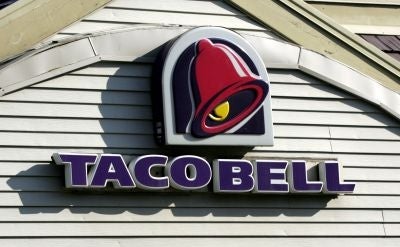Your support helps us to tell the story
From reproductive rights to climate change to Big Tech, The Independent is on the ground when the story is developing. Whether it's investigating the financials of Elon Musk's pro-Trump PAC or producing our latest documentary, 'The A Word', which shines a light on the American women fighting for reproductive rights, we know how important it is to parse out the facts from the messaging.
At such a critical moment in US history, we need reporters on the ground. Your donation allows us to keep sending journalists to speak to both sides of the story.
The Independent is trusted by Americans across the entire political spectrum. And unlike many other quality news outlets, we choose not to lock Americans out of our reporting and analysis with paywalls. We believe quality journalism should be available to everyone, paid for by those who can afford it.
Your support makes all the difference.Taco Bell is beefing up its counter attack against claims their meat filling is mostly binders and extenders by launching an aggressive TV ad campaign .
The ad, which airs across the US this week, features real Taco Bell employees who shot back at the "talk" that their meat filling contains only 35 percent beef - an allegation made in a class-action lawsuit in January.
It's been a war of words since an Alabama law firm filed the suit alleging the fast-food chain was using false advertising about its beef filling.
The TV ads are their second defensive strike against the lawsuit. In a cheeky move, the company also ran full-page ads in major newspapers across the US with headlines that read "Thank you for suing us," along with a list of their ingredients.
The chain maintains that their seasoned-beef recipe is made from 88 percent beef, as certified by the US Department of Agriculture, and 12 percent seasoning and spices.
To underscore the message, the commercial promotes a weeklong deal for an 88-cent Crunchwrap Supreme, which regularly costs $2.39 (about €1.73).
It's not the first time fast-food restaurants have been asked to explain themselves and clarify their "mystery meat."
In 2003, a Manhattan judge called McDonald's Chicken McNuggets a "McFrankenstein creation of various elements not utilized by the home cook." To prove his point, the judge rattled off a list of ingredients that included Dimethylpolysiloxane an "anti-foaming agent" also used in Silly Putty. The result was that McDonald's soon changed the recipe for McNuggets from being half-white, half-dark meat, to all-white meat.
In the same year, KFC bowed to pressure mounted by animal welfare group PETA, and agreed to change what the group called misleading statements about the company's treatment of animals. Information removed from the website included claims that chickens raised for KFC suffer no pain or injuries; that KFC prohibits its suppliers from giving growth-promoting substances; and that the company maintained an animal welfare policy for a decade.
Though PETA continues its campaign "Kentucky Fried Cruelty" in the US and abroad, the group called off its roasting of KFC Canada in 2008 after coming to an agreement. Chief among the concessions was that KFC Canada would use suppliers who use gas to kill their chickens painlessly.
McDonald's and KFC provide nutritional information on their websites, as does Taco Bell.
Here's a list of Taco Bell's seasoned-beef filling:
Beef, Water, Seasoning [Isolated Oat Product, Salt, Chili Pepper, Onion Powder, Tomato Powder, Oats (Wheat), Soy Lecithin, Sugar, Spices, Maltodextrin, Soybean Oil (Anti-dusting Agent), Garlic Powder, Autolyzed Yeast Extract, Citric Acid, Caramel Color, Cocoa Powder (Processed With Alkali), Silicon Dioxide, Natural Flavors, Yeast, Modified Corn Starch, Natural Smoke Flavor], Salt, Sodium Phosphates. Contains soybean and wheat.

Join our commenting forum
Join thought-provoking conversations, follow other Independent readers and see their replies
Comments